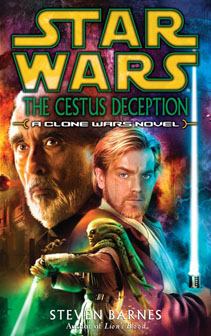Like “Shatterpoint,” its predecessor in the “Clone Wars” series, “The Cestus Deception” (2004) takes place on a single planet that’s in dispute between the Republic and the Separatists. But while “Shatterpoint” is an epic cost-of-war novel, Steven Barnes’ lone “Star Wars” book is a political morass, with readers invited to wade into it with Obi-Wan Kenobi, Kit Fisto and a clone trooper named Nate, with Asajj Ventress providing the villainy.
The conflict centers on JK (Jedi Killer) droids produced by Cestus Cybernetics, which is essentially the planet’s lone corporation and its oligarchical government. Obi-Wan and his team – who set up base camp in Cestus’ caves and valleys — try a variety of strategies to get the planet/corporation to stop producing and selling JKs to the Separatists. These strategies include offering a slightly better military contract with the Republic, digging up ancient documents that show the native X’Ting didn’t legally sell their land to Cestus Cybernetics, and staging a train car abduction and rescue of the government leaders to gain themselves public-relations points. In the end, they settle on sabotaging the factory.
Obi-Wan is uncomfortable throughout the ordeal, as was I with some of his strategies (particularly the fake train rescue). I expected him to cut through the crap and find a solution only a Jedi could come up with – like Mace in “Shatterpoint,” but perhaps less grandiose — but he never does. Barnes is making a point how even great Jedis can struggle to navigate the convoluted economic and political conflicts that lead to war, but still, I hoped for better from Obi-Wan. Also, it’s odd that Anakin’s not in the story. I know I won’t find Ahsoka in these pre-2008 “Clone Wars” yarns, but Anakin’s absence leaves a hole.
I suppose that hole is filled by Kit Fisto, but the Nautolan’s characterization is bland. The only things I come away with are that he has a flowing lightsaber dueling style and he’s fairly well-respected by his clone troopers. For a character who was popular for his toothy grin in “Attack of the Clones” and the “Clone Wars” microseries and for being part of “Team Windu” in “Republic” Issue 65 and the attempted arrest of Palpatine in “Revenge of the Sith,” Kit Fisto doesn’t pop off the page in “Cestus,” despite getting his highest page-count.
Nate, though, is a breakthrough. While Karen Traviss’ “Republic Commando” series – which launched later in 2004 — would go on to be the gold standard for exploring what it means to be human when you’re a clone, Barnes got there first. Nate starts to see himself as an individual rather than a cog in the machine when he sees how Republic supply runner Sheeka Tull – an ex-girlfriend of Jango Fett – looks at him. Sheeka gives him the name Jangotat (Mandalorian for “Jango’s brother”), a new identity that he gradually embraces.
Barnes also does a nice job making Ventress’ hatred of her enemies seep through the page (she should be on the cover instead of Dooku, who doesn’t appear at all in the story). In the Sith acolyte’s first book appearance after several microseries and comics appearances, we are reminded that she views the Republic (and its Jedi servants) as hopelessly corrupt. That argument isn’t without merit, except for the fact that she kills as a first resort, and Obi-Wan kills as a last resort.

In “Cestus,” Ventress makes a lot of references to her first battle with Obi-Wan on Queyta in “Republic” Issue 53, and her desire to kill him. Neither there nor here do I grasp why Obi-Wan specifically inspires her wrath, but I still superficially enjoy their rivalry. It goes to show how much mileage Ventress gets from the snarling performance of Nika Futterman on “The Clone Wars” TV series.
Barnes does some neat sci-fi writing with the JK droids, machines enhanced by a biological component – basically, the opposite of Grievous or Vader, who are organics enhanced by machine parts. The biological part of the JKs – dashta eels that are essentially undeveloped, as only a small portion of the species develops to full sentience – allows for the on-the-fly decision-making that makes them fast and deadly. However, in a cool twist, it turns out that when it comes down to it, that organic part prevents JKs from being able to kill.
“The Cestus Deception” isn’t a bad read. In fact, the generally short chapters make it flow briskly. Obi-Wan and Fisto are a bit dull, but Ventress spices things up. I was able to follow the political machinations, but was disappointed in the many paths not taken (for example, the thing about Cestus Cybernetics not legally owning the land seems to be forgotten by the author). The sci-fi stuff with the dashta eels is clever, but kind of tacked on. Still, the Jangotat-and-Sheeka romance is outstanding, giving “The Cestus Deception” the distinction of being the first major step in the “Clone Wars” saga’s many explorations of what it means to be a clone soldier.

